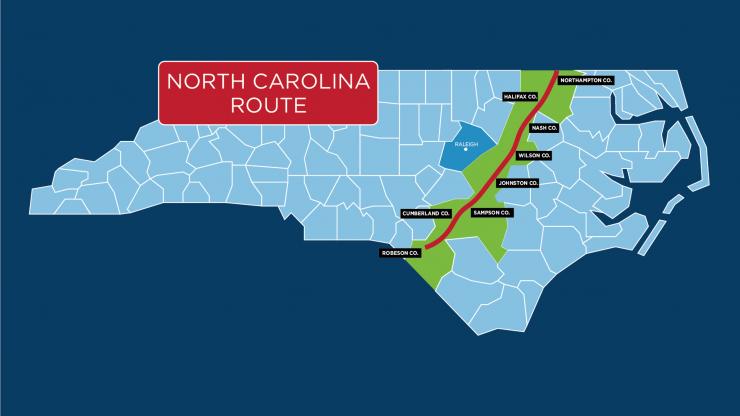One of the final remaining hurdles for the Atlantic Coast Pipeline, approval from the Federal Energy Regulatory Commission, was cleared Friday after FERC released a positive Environmental Impact Statement. The pipeline, if approved, would originate in the heavily fracked Marcellus Shale in West Virginia. The proposed route runs south through eight N.C. counties – Northampton, Halifax, Nash, Wilson, Johnston, Sampson, Cumberland and Robeson. The N.C. Department of  Environmental Quality now has to measure the project’s impact on the 453 acres of wetlands and 326 streams and rivers the pipeline crosses in the state. A permitting decision is expected Sept. 18.
Environmental Quality now has to measure the project’s impact on the 453 acres of wetlands and 326 streams and rivers the pipeline crosses in the state. A permitting decision is expected Sept. 18.
Advocates of the pipeline call it a “vitally important infrastructure project that will provide energy for the region’s booming economic growth, new jobs and tax revenues for poor areas, and a cleaner-burning fuel alternative to coal”. (News & Observer, 21 July 2017) In contrast, opponents of the pipeline say the environmental consequences are much too severe and the project rationale too weak for the DEQ to approve the permit. “It’s a huge impact on the waters and wetlands in Eastern North Carolina, and the way these pipelines are often permitted, these impacts just aren’t considered,” said Geoff Gisler, a senior attorney at the Southern Environmental Law Center. Aaron Ruby, a Dominion spokesman, calls opposition groups “a vocal minority.” But pipeline opponents were in the majority at the DEQ hearing on Thursday in Rocky Mount. Opponents were in full gear wearing red protest signs and presenting a long list of environmental and ethical concerns.
In November of 2016, both Reverend Doctor Jennifer Copeland and Susannah Tuttle, the Executive Director of NC Council of Churches and the Director of NC Interfaith Power & Light respectively, spoke at a Fayetteville press conference passionately stating their opposition to the construction of the Atlantic Coast Pipeline. A quote from Reverend Copeland’s statement to the press:
“When I know that methane—the element that leaks from natural gas pipelines—is 84 times more detrimental to the atmosphere than carbon dioxide, I must make a choice. When I know that fracking—the method used to obtain the natural gas that will flow through this pipeline—causes irreparable damage to drinking water and creates seismic instability, I must make a choice. When I know that pipelines cut through pristine landscapes and across tribal lands, I must make a choice. I can keep doing what I’m doing, for sure, but now I know that what I am doing is an affront to creation, a violation of the gift of creation.”
A quote from Susannah Tuttle’s statement to the press:
“Pipelines connect and we DO so deeply need to be connected to each other. We need pipelines of solidarity that remind us that the hopes and dreams of all the families that are on the path of this pipeline are not so different than the hopes and dreams that we have and of the hopes and dreams of people around the globe on the front lines of climate change.
But this Atlantic Coast Pipeline is not the pipeline that we need. We need pipelines carrying ingenuity to bring us new solutions for getting our electricity from sun & wind, to produce clean energy from heaven instead of dirty energy from hell.
This Atlantic Coast Pipeline is not the pipeline that we need. We need pipelines to bring us an expanded consciousness to see that we are deeply connected to the entire ecosystem, to the plants and to the animals, to see that what we do to our natural world will touch us too, and soon.”
In Pennsylvania, a group of resolute nuns have used a different tactic to delay the construction of their state’s threat, the Atlantic Sunrise Pipeline. This past month, an open-air chapel set up by the Catholic nuns to block construction of the natural gas pipeline was dedicated on a spot directly in the pipeline’s proposed path. The ceremony, hosted by grass-roots opposition group Lancaster Against Pipelines, is called “Stand With the Sisters” and is in support of the Adorers of the Blood of Christ, a Catholic order of women in opposition to the pipeline.
The Adorers own the land that the Atlantic Sunrise pipeline would cross. “It’s not about money, it’s about principle. And the nuns have a land ethic that says this Earth is a sanctuary and we regard it as sacred, and we’re going to work to protect it,” Mark Clatterbuck of the Lancaster Against Pipelines group told CNN affiliate WGAL-TV.
TAKE ACTION
The N.C. Department of Environmental Quality Division of Water Resources is accepting public comments on the Atlantic Coast Pipeline, now through 5 p.m. Aug. 19.
Send written comments to: 401 Permitting, 1617 Mail Service Center, Raleigh, N.C., 27699. Written comments may also be submitted by email to PublicComments@ncdenr.gov. Be sure to include “ACP” in the email’s subject line.
To learn more about the DEQ permitting process, visit deq.nc.gov/news/hot-topics and select Atlantic Coast Pipeline.
